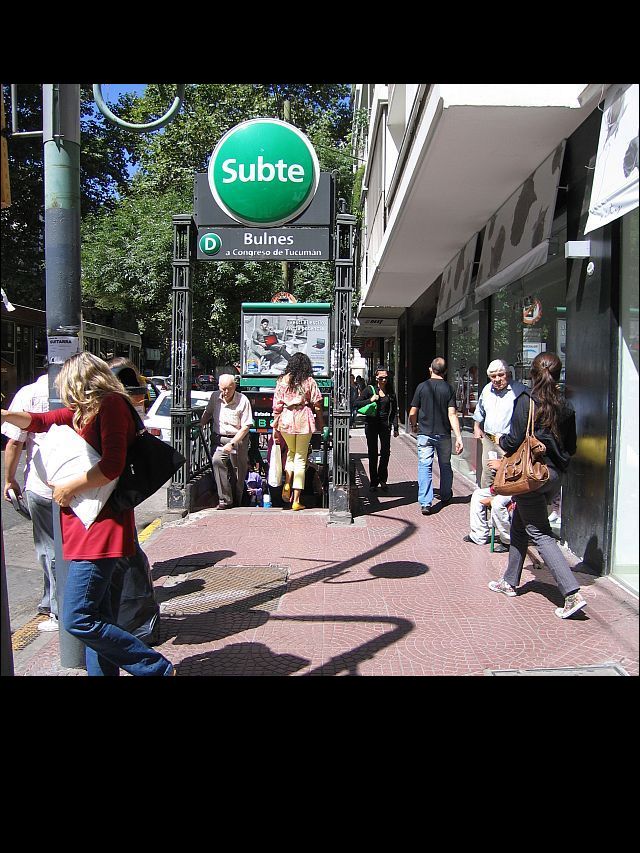Petty Thievery in Latin America
 How I Managed to Get My Wallet Stolen on the Subway in Buenos Aires
How I Managed to Get My Wallet Stolen on the Subway in Buenos Aires
Last week I was a crime victim in Latin America for the first time. I have been in and around Buenos Aires for extended stays several times in the past few years without even a suggestion of a problem. But that all changed last week.
I rented an apartment in Buenos Aires. I paid the real estate woman out of my wallet, put the wallet in my purse, zipped the purse, and left for the subway.
The subway was at capacity. The expression “packed like sardines” has a new meaning for me after that trip. People were pressing me on all sides. When there was no space left for even one more person, ten more got on. It was pretty amazing.
A very lovely young woman stood to my left. I was holding to the rail overhead, but she tapped me, smiled sweetly, and indicated she was making room for me to hold on to the vertical post she was standing next too. I thought, these Argentina people are so sweet. Well they are. But it pays to be a bit skeptical. I did reach for that post. My purse was on my shoulder.
I was amazed the next morning when I opened my purse and my wallet was gone. I couldn’t believe it. WHERE could it be? The subway was the only explanation. But how could they have gotten the wallet without me having a clue, with my purse right there on my shoulder? A companion who was with me thinks there were three people working together. He was a short distance from me but could not see well enough to know for sure. But the woman was to my left, there was a man close behind me, and the man to my right had a heavy winter coat folded over his arm. What was he doing with a heavy winter coat in the middle of summer in Argentina? It was reason for suspicion but I didn’t even notice the coat. My friend thinks that the coat helped to shield their activities, and that was how the wallet was taken.
In my case, I think that after so much exposure in Buenos Aires with absolutely no threat, I got careless. It is human nature, when nothing happens for a long time, to think that it never will. Not so!
Fortunately my serious money was in a pocket zipped into the lining of my purse. The wallet contained only small bills and cards that just needed to be reported and replaced.
The worst of it is that my passport was in the wallet. Since I am not leaving the country any time soon, there is time to replace the passport without stress, but it is inconvenient and there is a cost.
Since this incident I have observed other women. Some apparently have a high level of trust, carrying their purses swinging freely. But most hold the purse tightly under their arm (even though most are shoulder purses) and if they have a fold down flap with a catch, many hold the purse in front of them with a hand on the catch.
Remember that I am in Buenos Aires, a city of seven million in the city proper. One should not be surprised to find pick pockets in any city this size. There are capital cities in South America that I would call dangerous, but neither Buenos Aires, Argentina, nor Montevideo, Uruguay, would be included on that list.
For those of you who have lived in New York or Chicago—or maybe even London—all of this is old information. But for those of you who are used to a smaller, less crime-ridden area, I have collected the following stories from other expats—especially for you–so that you will have more than just vague and general information. Our hope is to give you a more specific idea the things to watch out for.
One expat tells of knowing that she should not hang her purse on the back of a chair. So she put it on the floor between her feet in an upscale restaurant in a supposedly low crime area. Two well-dressed (don’t let that fool you) men came in, sat behind her, and managed to get the purse from behind. She had had someone take a picture of her and her companion at the table and when she saw the picture later, there were the faces of the two men right in the picture. (Hint: If the purse had a strap, she could have wrapped the strap around her legs. But the safest place for it was in her lap.)
The Buenos Aires bus station is one place to be very careful. One man told us about losing his backpack there when someone with an ice cream cone “accidentally” bumped into him and got ice cream on him and his backpack. The “careless” person was hugely apologetic, went and got napkins to help him clean up . . . while an accomplice stole his backpack. And if you have more than one bag and someone gets one of them, what do you do? Chase after him while the accomplice takes the others? If you are traveling with a companion, you might want to decide ahead of time, in the event something is snatched, who will stay with the other luggage and who will give chase, if anyone.
One street smart traveler told me if there is anything unusual—someone spills something, someone trips and falls—whatever—gather your things immediately and step back and survey the situation. Do not allow yourself to be distracted by the incident. Focus on your possessions until you can determine what is going on. Any incident can be a distraction for a set of thieves working together. And they do work together. Even if they did not create the incident themselves, there are opportunists. One of our friends who operates a hospedage* in Chile had a fire break out in a neighboring building. While everyone ran out to the yard to look at the fire, a thief came in from the street and stole a number of items from the house.
Other things that people have lost are: a camera taken from a backpack stowed under a bus seat with the backpack opening to the rear. We heard of one entire backpack, stowed under a bus seat, that was taken from behind. Many bus seats have a bar underneath at the rear that prevents this. But not all do.
Our group once had a backpack taken in Peru when a man tripped and spilled a bottle of water beside our seat on the bus. Since the backpack was on the rack directly over our heads, it is amazing that there were three of us sitting below it and none of us saw the backpack leave the rack. Our street-wise companion who knew to be careful of “incidents,” checked above our seats almost immediately and saw that the backpack was gone. He was able to retrieve it before the next stop while it was still on the bus–and regretted for days that he didn’t give the man who was involved a good taste of Yankee retribution. But he didn’t know if he might spend his vacation in a Peruvian jail. (Hint: When several of us are traveling together with backpacks stowed overhead, we now detach the straps and refasten them so that all packs are tied together, as a precaution.)
In Peru this type of crime is so common that it is almost the national sport. When you tell Peruvians about a loss or attempted theft and how it was done, their eyes often light up as if you are telling them how close their soccer team came to winning the game and what their strategy was. The more southerly countries are not quite that bad. But don’t underestimate them either.
Even George Bush’s daughter had her purse lifted in Buenos Aires from under the table where they were eating. And what were all those secret service men doing at the time?
A businessman here in Buenos Aires told me about putting his briefcase on the floor right next to his chair in a restaurant. Two men in suits walked in and sat near him. He noticed them and moved his briefcase to a “safer” place between his feet. When he got up to leave and picked up his briefcase, the men had switched cases with him.
How these people manage these feats is beyond me. But they do. I asked the briefcase victim what he could have done differently and he said either keep your possessions in your lap, or leave them at home in the safe!
Here is another scenario: A young man comes running down the street. No big deal, right? Maybe he is about to miss a bus. But . . . maybe not! As he goes by at full speed, he grabs the strap of your purse. With such momentum it is impossible to hang on if he gets a good grip. For this reason, many women wear shoulder bags, put the strap over their heads to the opposite shoulder from the side the purse is on, and then keep the purse in front. This has a couple of benefits. Just the fact that it doesn´t look easy is a big deterrent to a thief.
Another situation for caution is with your bags in a taxi. Stay with the taxi driver while he (and perhaps you) load your bags into the trunk. Time your entrance to the taxi for after the trunk is securely closed (when an accomplice or stander by cannot take something out unnoticed) and your driver is entering the taxi. When you arrive at your destination, don’t just jump out. Take your time until the driver is exiting the taxi also. Don’t get out with the driver behind the wheel and your bags in his trunk with no companion left behind in the taxi. If you have a companion, your companion can delay a bit exiting the taxi. Particularly if you have bags inside the taxi as well.
Some people say that, in Buenos Aires, it is best to take only the Radio Taxis and not the taxi of an independent operator. But I suggest being careful in all of them.
Thankfully most of what you need to be cautious about in this part of Latin America is petty crime. But it is still important to be cautious on every level, as you would be in any large city.
I find Uruguay a more honest country than Argentina. Yet Montevideo has its corruption as well and one Uruguayan woman I know of has lost her purse to snatchers twice. Others have lived in Montevideo all their lives and never had it happen even once. Even once is one time too many for most of us.
I hope that from these scenarios you can get the idea and you can use your own good judgment from here. Just think cautious, be aware of your surroundings. If you don’t see the young man running down the street in the first place, or like me, you don’t notice the heavy coat over the man’s arm in the subway, you won’t take necessary precautions.
Be nice and enjoy the wonderful people here because there are many. But don’t let your guard down. There are challenges here to mitigate against, but it’s a beautiful and interesting place.
We look forward to seeing you one of these days . . . in Latin America!
*Hospedage = A hospedage is similar to a hotel, with rooms for rent to guests, but normally the owner and his or her family live there as well. Some are similar to what is often called a bed and breakfast.
————————————————————————————————————————————————-
We encourage your comments and suggestions. Please be sure to sign up for email notifications if you haven’t done so already. Likewise, if you decide that you want to cancel your subscription, we will miss you, but we understand.




My partner and I stumbled over here by a different web page and thought I should
check things out. I like what I see so now
i am following you. Look forward to checking out
your web page repeatedly.
Thanks, and Welcome to Four Flags Journal.
As I was used to travel arround latinamerica when I was "younger", I really have a theory about pickpockets in different ountries.
Starting with Argentina, spefically in Buenos Aires, to be a pickpocket is a profession, they even do competions on who are the best or have the best way to steal without being noticed, first of all they choose the rush hours in subways, trains and buses,they always goes in a couple or three of them , one check the person and they even mark their purse (for example inside a bank when you're taking money) with a chalk,of course you don't notice that because maybe they ask the hour or talk about the weather in a line ,then another follow you outside,wherever you go and another steals you when you're in a bus or a train ,they really know how to move. they usually use a kind of cutter to cut a piece of your purse(so you're not able to notice it until you're at home ) and in the crowd they are able to steal without being seen .so my advice is …… if you are in a bank , before going out , go to the bathroom , check your purse , if it 's marked , take it away, and put the big paper money inside your sock or underware, and keep only small cash in your purse , never take passports with you , a notarized photocopy is enough ,they also like passports , they can sell them in a good prize,so if you notice someone is near you ,can be well dressed, or with babies in their arms , put your purse in front of your stomach , it's difficult for them to cut infront of you .
I'll continue with other countries afterwards , but remember , after being able to avoid porteños 'spickpockets , you're able to recognize the others in other countries,………They are really the best!!!!!!!!!!
MARCELA
Arlean….
Very helpful. I recognize the Peru story from a couple years ago.
While in the military, our group had an outstanding record in "our" war, so we went home the long way, clear around the world. Places like Bombay and Calcutta in THOSE long ago days, a commie riot in Rangoon, etc, we felt FAIRLY safe from crooks in Naples. HA. There are MASTER con men and women there. (Or were, to be fair)
A favorite was the dudes selling Beretta .25 caliber automatics for ten bucks. Even then that was about half price.
Two things happened. If you bought from a temporary "street stall", they would show you the nice new Beretta, then turn and "wrap it for you".
You guessed it. A buncha guys got back to the ship and found a nice river rock in the package.
Another way was to hustle you in a crowded area, with the usual alleys and byways and doorways nearby.
One guy deals with you, hands you the Beretta, you hand him the Ten, and Voila! He pushes you backwards, grabbing the Beretta, some street urchin was on knees behind you, down you go in the street, the urchin uses the crowd to go one way, the "pusher" is already gone by the time you get up with one helluva headache and "don't know the territory"
Plus: No One Saw A Thing.
I'm sure your super son has a thousand such stories.
We miss you here in the USSA.
B
menng